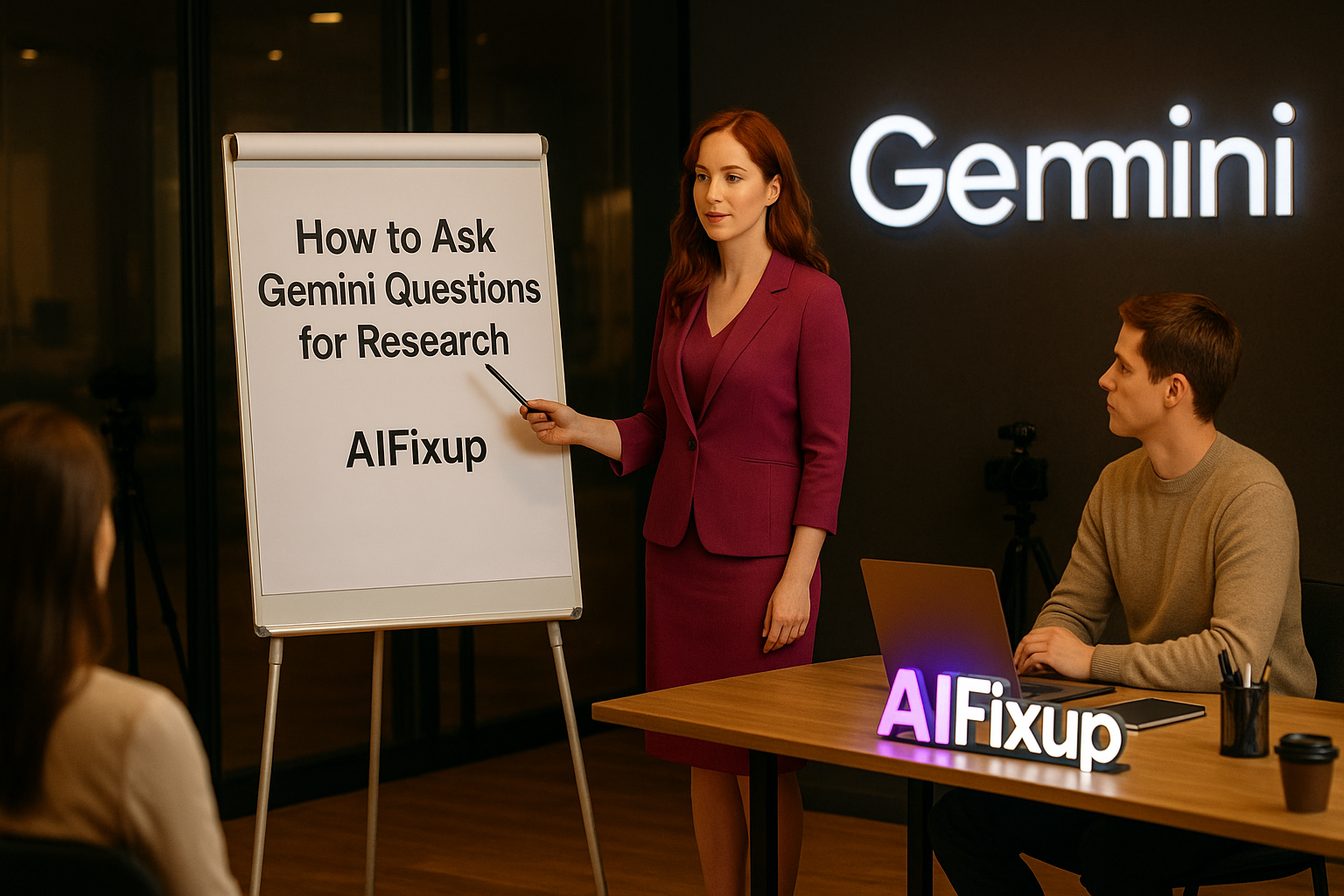Learn how to ask Gemini questions for research and get clear, reliable insights that help you study, explore, and understand complex topics faster.
How to Ask Gemini Questions for Research
When I first started using AI tools to support my learning, I wasn’t quite sure how to make the most of them. I knew they could answer basic questions, but what I really needed was something deeper — something that could help me think. Once I figured out how to ask Gemini questions for research, everything changed. I stopped just looking for answers and started having meaningful, guided conversations that led me to real understanding.
Whether you’re a student, writer, professional, or lifelong learner, knowing how to ask Gemini questions for research opens up a whole new way to explore complex ideas. It’s not about asking simple yes-or-no questions — it’s about having a dialogue that sharpens your thinking.
Here’s why learning how to ask Gemini questions for research is so helpful:
- 📚 Clarity Through Conversation: Gemini breaks down complex ideas into simple, digestible explanations.
- 🧠 Guided Learning Paths: It adapts to your level and builds on each answer.
- ⏱️ Instant Access to Insights: No waiting, no digging — just ask and explore in real time.
- 🧩 Contextual Understanding: Gemini connects your follow-up questions to your earlier ones, just like a tutor.
- ✍️ Idea Refinement: It helps organize your thoughts for essays, proposals, presentations, or reports.
When I finally realized that asking Gemini the right kind of question could take me further than any search engine ever had, research became something I actually looked forward to.
📚 Table of Contents
• 💡 Advantages
• 🧭 Wondering How to Begin?
• ✍️ Effective Prompt Techniques
• 🧷 My Go-To Prompt Picks
• ⚠️ Common Pitfalls and How to Avoid Them
• ❓ SSS – How to Ask Gemini Questions for Research
• 💬 User Experiences
💡 Advantages
Before we dive into the steps, I’d love to give you a quick look at what makes Gemini a powerful companion for research. These are the things that stood out to me early on.
| 🌟 Advantage | 🧭 How to |
|---|---|
| 🧠 Deep Concept Breakdown | Ask layered questions to get structured, step-by-step explanations. |
| 🗂️ Organized Information Flow | Gemini presents knowledge in outline or paragraph form depending on your need. |
| 🧏 Interactive Exploration | Use follow-up questions to dig deeper into any topic instantly. |
| ✍️ Writing Support | Turn research into usable outlines, summaries, or drafts right away. |
| 📊 Data Contextualization | Ask for trends, comparisons, or historical context across subjects. |
| 🎯 Focused Filtering | Narrow down topics with tailored queries (e.g., “Compare only environmental factors”). |
| 🧠 Memory Within Threads | Stay in the same conversation and build complexity without repeating context. |
| 🌍 Multidisciplinary Reach | Use Gemini across science, history, technology, literature, and more. |
🧭 Wondering How to Begin?
When I first tried figuring out how to ask Gemini questions for research, I assumed I had to write perfect academic prompts. But I quickly learned that it’s more about curiosity and structure than perfection. You’re not talking to a search bar — you’re having a conversation.
So here’s how I got started, and how you can, too.
1. 📝 Choose a Research Topic
Start with something specific enough to explore — for example, “climate change effects in Southeast Asia” or “how cognitive biases affect decision-making.”
2. 🧠 Start With a Broad Prompt
Begin with a general question like:
“Can you give me an overview of how [topic] works?”
This helps Gemini introduce the idea in an easy-to-digest way.
3. 🔍 Ask for Definitions and Subtopics
Once you have an overview, dig into specific pieces:
“Can you define [key term]?” or
“What are the main causes of this phenomenon?”
4. 📊 Request Comparisons or Timelines
This is where research gets richer. Try asking:
“How has this concept evolved over time?” or
“Can you compare this idea with [related topic]?”
5. ✍️ Turn Answers Into Study Material
Once you’ve gathered enough insight, ask Gemini to help shape it:
“Can you turn this into a summary or outline?”
6. 🔁 Build With Follow-Ups
Gemini remembers what you’re asking in that thread, so you can go deeper. Ask things like:
“Can you explain that last point with an example?”
or
“How does this relate to X?”
7. 📥 Save, Copy, or Export
Once your thread is full of value, copy the key pieces or ask for a clean export format like a study guide, bullet points, or a list of citations (if needed for your use).
✍️ Effective Prompt Techniques
The more specific your question, the better your results. Over time, I started developing a few reliable prompt structures that always returned excellent insights. Let me walk you through some of my favorites.
1. 🧪 “Explain and Define” Combo
Perfect for grasping a concept and its real-world relevance.
• 📥 Prompt: “What is herd immunity, and how does it work in public health settings?”
• 📤 Output Insight: Combines clarity with practical understanding.
• 📝 Sample Output: “Herd immunity occurs when a large portion of a population becomes immune, reducing disease spread. It helps protect those who cannot be vaccinated.”
2. 📚 “Historical Context” Request
Helpful when understanding the background of a concept or event.
• 📥 Prompt: “What led to the rise of renewable energy focus after the 1970s?”
• 📤 Output Insight: Gives insight into causation, not just definitions.
• 📝 Sample Output: “Oil crises, environmental movements, and technological advances led to a growing global interest in renewable energy alternatives.”
3. 🧰 “Compare and Contrast” Breakdown
This works great for papers and discussions.
• 📥 Prompt: “How do socialism and capitalism differ in terms of economic structure and resource distribution?”
• 📤 Output Insight: Structured side-by-side comparison.
• 📝 Sample Output: “Capitalism emphasizes private ownership, competition, and profit; socialism prioritizes public ownership and equal distribution of resources.”
4. 🧭 “Step-by-Step Walkthrough”
Use this for processes, systems, or scientific methods.
• 📥 Prompt: “Can you walk me through the carbon cycle in steps?”
• 📤 Output Insight: Converts complex systems into digestible stages.
• 📝 Sample Output: “1. Carbon enters atmosphere via respiration… 2. Plants absorb it during photosynthesis… etc.”
5. 🎓 “Explain Like I’m a Beginner”
Especially helpful when approaching a new subject.
• 📥 Prompt: “Can you explain quantum entanglement like I’m new to physics?”
• 📤 Output Insight: Simplifies without losing essence.
• 📝 Sample Output: “Imagine two particles connected, so that even if they’re far apart, changing one instantly changes the other — like a magic link.”
🧷 My Go-To Prompt Picks
After weeks of using Gemini to support research, I naturally fell into a rhythm with a few prompts that never fail me. These aren’t fancy or formal — just deeply effective.
1. 📊 “What Are the Latest Developments in…?”
• 📥 Prompt: “What are the latest developments in AI and climate modeling?”
• 📤 Output Insight: Brings you up to date on real-world innovations.
• 📝 Sample Output: “Recent models use AI to simulate climate scenarios with greater accuracy, aiding predictions for sea-level rise and extreme weather.”
2. 🧭 “What Do Experts Say About…?”
• 📥 Prompt: “What do experts say about universal basic income?”
• 📤 Output Insight: Offers multi-perspective input from academic or policy viewpoints.
• 📝 Sample Output: “Supporters highlight poverty reduction; critics raise concerns about work incentives. Studies from Stanford and Oxford have explored both sides.”
3. 🧠 “Can You Help Me Make an Outline for…”
• 📥 Prompt: “Can you help me make an outline for a paper on biodiversity loss?”
• 📤 Output Insight: Instantly converts scattered ideas into structure.
• 📝 Sample Output:
I. Introduction
II. Causes of biodiversity loss
III. Case studies
IV. Global policy response
V. Conclusion
⚠️ Common Pitfalls and How to Avoid Them
Even though Gemini makes research easier, it’s still important to guide it well. Here are a few mistakes I made early on — and how you can avoid them.
| ⚠️ Mistake | 💡 How to Avoid It |
|---|---|
| 🤐 Asking Too Broadly | Narrow your question to one concept or relationship at a time. |
| 📚 Not Using Follow-Ups | Build depth by layering questions in one thread. |
| ⏳ Asking for Too Much at Once | Break your prompt into stages to get focused responses. |
| ❌ Not Verifying Sources | For academic work, always verify key claims with external citations. |
| 🧭 Skipping Clarification Prompts | Don’t hesitate to say: “Can you explain that last part again, more simply?” |
❓ FAQ – How to Ask Gemini Questions for Research
🧠 Can Gemini help with academic writing?
• Yes — it helps with outlines, summaries, definitions, and draft generation.
📊 Does it cite real sources?
• It provides helpful summaries, but for published work, always verify independently.
📖 Can I ask for explanations across multiple fields?
• Absolutely — Gemini understands and connects topics from science to literature.
✍️ Can it help me structure essays or proposals?
• Yes — it can organize your ideas into logical, clear formats instantly.
🔁 Is it okay to ask follow-up questions?
• Definitely — that’s where Gemini shines. Keep building on your curiosity.
🧾 Can I use it for note-taking?
• Yes — you can convert responses into clean notes or export outlines.
🌍 Does Gemini support research in different languages?
• It works best in English, but can handle questions in many global languages too.
💡 What types of research does it support best?
• Conceptual, comparative, exploratory, and summary-based research work beautifully.
💬 User Experiences
Gemini helped me break down a dense philosophy paper into parts I could actually understand.
— Rachel, Undergraduate Student
I ask follow-up questions like I would in a class — and Gemini adapts to each one.
— Daniel, Policy Researcher
Honestly, this changed how I study. It’s like having a tutor without judgment.
— Mai, Medical Student
🌟 Final Thoughts
Once you learn how to ask Gemini questions for research, studying stops feeling like a chore. It becomes a conversation — one that guides you toward deeper knowledge with every follow-up. Whether you’re tackling your first big essay or preparing a client presentation, this kind of AI support really makes a difference.
🗣️ What Do You Think?
Have you tried using Gemini for research? Drop a comment with your favorite prompt or share a challenge you faced. Let’s learn from each other’s questions.
📚 Related Guides
• How to Use Gemini Live Voice Chat
• How to Get Gemini to Summarize PDFs
• How to Generate YouTube Playlists via Gemini
• How to Use Gemini in Google Docs
📢 About the Author
At AIFixup, our team brings over 5 years of hands-on experience in conceptualizing, developing, and optimizing AI tools. Every piece of content you see on this platform is rooted in real-world expertise and a deep understanding of the AI landscape.
Beyond our public content, we also share exclusive insights and free prompt collections with our subscribers every week. If you’d like to receive these valuable resources directly in your inbox, simply subscribe to our Email Newsletter—you’ll find the sign-up form at the bottom right corner of this page.













Leave a comment